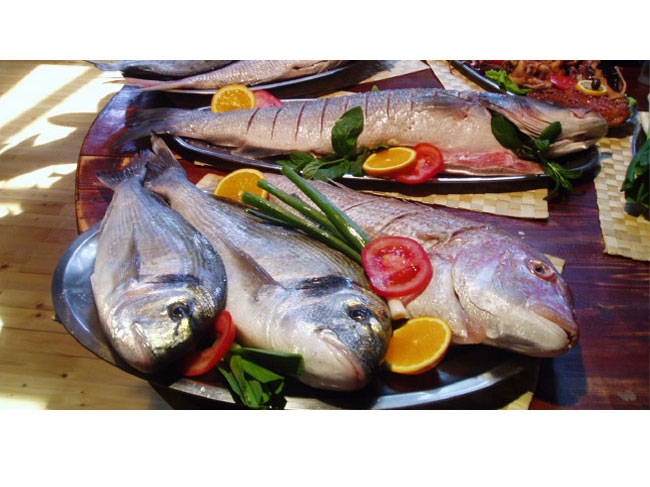Recepies
They offer to the guest the best food and drink they have in the house, reserve for him the best place at table and do their best to make his stay in their home as comfortable as possible.
Bay of Kotor fish stew
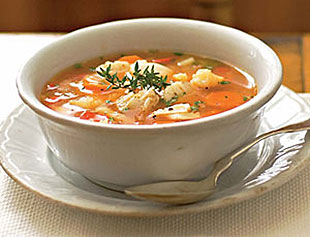
Chop onions and put in a slightly heated pan with 1 dl of olive oil. Add celery and parsley, prepared seasoning, red pepper and garlic. Put fish on it. Put the remaining onions, celery and other over fish. Pour over white wine or fish soup, add some more oil so that the pan is almost full. Leave to boil and then cook on low heat for minimum of 2 hours. The longer the better!
Shells boiled in wine
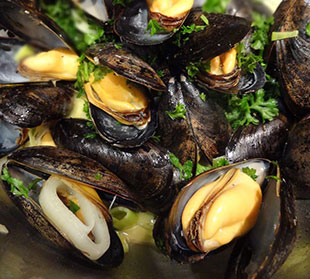
Mussels are most frequently prepared by putting into a pan, seasoned with parsley, garlic, bread crumbs and pepper and poured with wine and oil. Boiled on high heat they let out sauce in which they are boiled until the shells open.
Cheese from oil
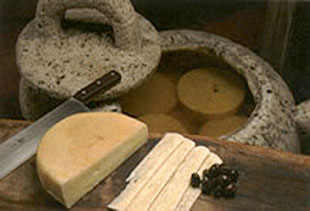
Cut dried cheese in pieces, put into a glass pot or a jar, pour a mixture of olive and sunflower oil, cover and put in a cold place (possibly in a refrigerator). Leave to mature for at least 60 days.
Imam bajeldi
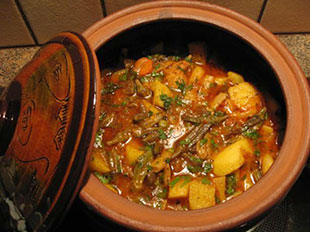
A story is told among the Muslims from Bar that a long time ago one imam (Muslim leader or, priest) tried a delicious meal made of braised vegetables and fainted with beauty. To honour such an impression the meal was named imam bajeldi which in Turkish means imam fainted with beauty.
To prepare the meal, boil aubergines, cut along the length and put into a pan. Braise onions and garlic separately, add tomato, spices and vinegar. The aubergines are topped with the mixture and well baked.
Pašticada
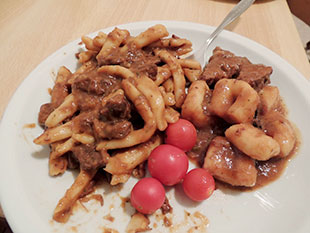
Fry on oil meat stuffed with bacon and carrots. Add onion, the remaining bacon and carrots, celery, garlic, bay leaves, beef soup and braise till the meat becomes tender. When the meat is almost cooked, add wine, tomato, tomato purée and braise for 15 more minutes. When the meat is almost tender, take it out, cut in pieces, put in a pan, pour the sauce over it and braise for a couple of minutes. It is served with makaruli.
Paštrovski makaruli (Macaroni from Paštrovići)
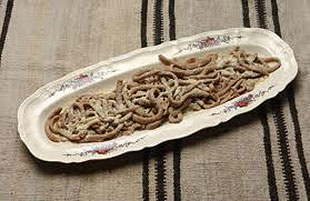
Make a hole on a heap of sieved flour with a hand, add salt, little water and knead. While kneading sprinkle some flour so that it does not stick to the table or the board. The dough can be considered done only when it starts separating from hands and the table and its surface become smooth. It must not be either too hard nor too soft.
When ready, leave it for half an hour. Then make makaruli with special needles. Leave them to dry. Boil in salted water till they become tender. Strain makaruli and serve in a pan, pour olive oil and cheese from brine on them.
Balšića tava (The pan of Balšići)
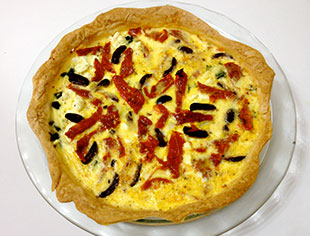
Cut meat into portions (2 pieces in a portion of 100 gr), boil with root vegetables, add salt according to taste and strain after boiling. Then put in a frying pan greased with butter and put to bake in the oven for 8 to 9 minutes. In the meantime make the topping (royal mass) of eggs, milk and cream, and pour over the meat until it is almost completely covered with the topping. Bake for another 5 minutes till it becomes reddish, take out of the oven, serve in bowls and decorate with parsley.
Bamijas prepared in the Ulcinj manner
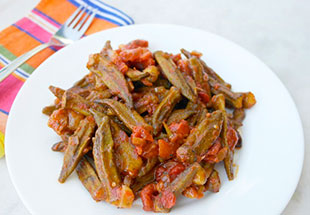
Prepare bamijas in the meantime. Clean them, wash and braise, cook onions with spices (salt, ground pepper, a little of prepared seasonings). When bamijas are almost tender remove them from fire. Put meat into a ceramic pot with bamijas and cook for 5 more minutes in the oven at 200 degrees. Serve warm.
Carp in a frying pan
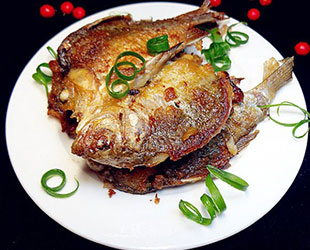
Cut the carp on both sides, salt, and put to fry in oil. During that time, braise chopped onions on oil. After a while add gradually 3 spoons of flour, 1 small spoon of pepper, tomato, 2 glasses of water, plums (dipped in hot water previously), chopped apple and quince, 1 spoon of sugar, 4 spoons of wine vinegar. Salt as needed. When the carp is fried pour this mixture over it and leave it to bake for half an hour until it is well fried.
Trout in sour milk
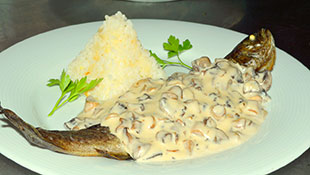
Clean the trouts, prepare a frying pan and fry the trout in lot of oil. Put the chopped garlic and a little salt in the mild sour milk and stir. In a deeper pan, pour the prepared sour milk over the warm fried trout, so that each piece of trout is covered with milk. Pour one spoon of oil in which the trout was fried over the surface. Pour some black pepper. Cover the pan with an aluminium foil and put into a fridge for 4-5 h.
Lamb in milk
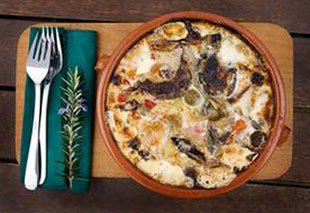
Wash the meat, put into a pot and pour milk over it, add one whole carrot, bay leaves, pepper and salt as needed. Boil peeled whole potatoes in another pot. When the meat is boiled, take it out of the pot, put into a deeper pot and add whole boiled potatoes and carrot. Pour over it strained milk in which the meat was boiled and garnish with parsley.
Cheese cake
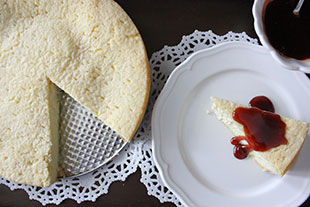
Crush cheese, add eggs, grated rye bread (dipped in milk and sour cream), sugar, vanilla sugar, baking powder, lemon peel and pour all together onto hot grease. Bake in the baking pan until it becomes reddish.
Smočani kačamak (Fatty porridge)
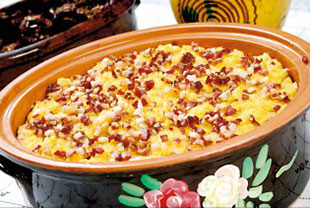
One (1) kilo of peeled potato is cooked in salty water - put as much salt as you like. When the potato is almost completely cooked, without pouring the water in which it was cooked off, add 3 – 4 handfuls of wheat or maize flour and continue cooking it. When you put the flour into the pot, make a hole in the middle of that pile with a tucanj or kačamaš (a specially designed big wooden spoon with a flat and wide lower part used for mashing kačamak) and cook it for about 30 to 40 minutes in a medium-high heat.
When it is cooked, pour the remaining water off, remove the pot from the heat and start mashing the mixture with a kačamaš taking the pot back to heat from time to time until the potato becomes like a paste without any lumps. In another pot melt 3 - 4 spoons of skorup (cream skimmed from milk) and a crumbled block of cheese (do not melt these completely so that the lumps can be seen all over kačamak), pour it over the hot kačamak and stir it. When the mixture is stirred well, kačamak is ready to be served. The best thing to serve with it is kiselo mlijeko - yogurt.
Peppers in jardum
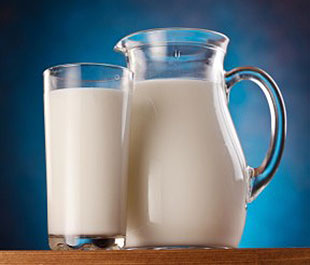
Wash peppers, take the stalks out, then put into a wooden vessel and leave for 2-3 days. Then pour lamb milk over it (jardum), put some salt and leave for 15-20 days. Should be served only after that period of time passes.
Japraci
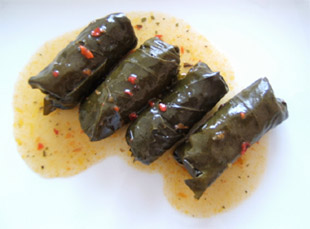
Separate fresh, good and young leaves of raštan from the stem and remove the thick part of the leaf. Wash in cold water and boil in boiling slated – sour water for a couple of minutes. When the leaves are blanched, take them out and put immediately into cold water so as to preserve their natural colour. Keep in cold water till you use them again.
Separate veal neck or shoulder-joint from bones, surplus tough parts and fat and cut in small pieces. Clean onions, wash and chop. Clean and wash rice, and then strain well. If we add dry meat when preparing japraci, it must be cut and put so that one portion contains one piece. Fry on grease chopped onions in an adequate heated vessel. Add chopped meat to onions and fry all together.
When onions and meat are fried add the prepared rice and fry all together. Season the mass with a little salt, ground pepper and parsley. Let the prepared stuffing cool. Put the stuffing in leaves and roll it. Boil rolls in pot for 2 hours. Serve with kiselo mlijeko - yogurt
Malisorske priganice
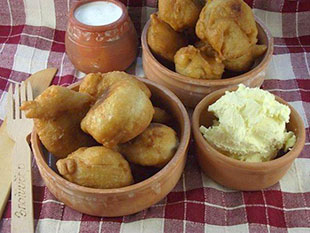
In tepid, mildly salted water boil wheat dough, so that it is a little more compact than a mash. Put a little dough into well heated oil in a frying pan, so that it floats in grease. The dough should not rise. When the priganica is red on both sides, take it out of the pan and serve with honey.
Raštan prepared on smoked joint
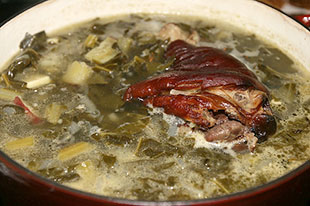
Wash raštan well, remove the hard parts, then tear in pieces with hands and put in boiling water to cook. At the same time cook dry pork joint, a piece of dry bacon and a piece of pork head. When all this is cooked, put all together into a pot to cook on the hearth. When half boiled add several peeled halves of potatoes. Take care not to overcook the raštan and not to add too much salt as the meat itself is quite salted.


